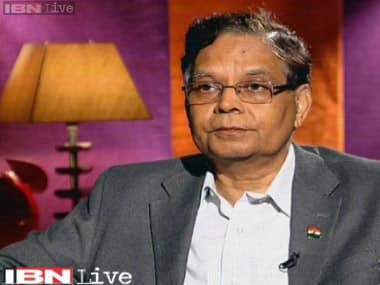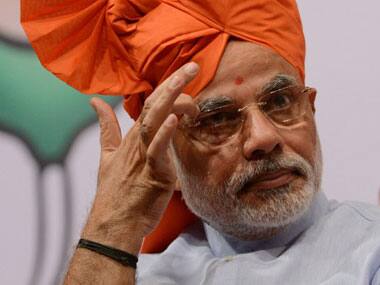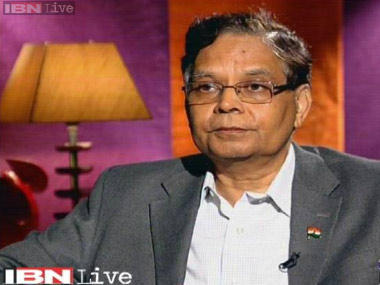It looks like that the next government has started receiving economic advice from economist Professor Arvind Panagariya even before the votes are counted. According to him, the country could grow at 6.5 per cent during the financial year 2015, if the government pays heed to his advice. In an interview to the Indian Express, Prof Panagariya’s suggestions include a strong prime minister (who could assure the bureaucracy that “responsibility for all their legitimate decisions rests with him”) a pragmatic environment minister, and the end of policy paralysis. In agriculture, he wants the minimum support price and procurement to be replaced with ‘deficiency payment’ as in the US. [caption id=“attachment_1509303” align=“alignleft” width=“380”]  Panagariya’s suggestions fly in the face of the BJP’s original economic model. Ibnlive image[/caption] In other words, the ‘pragmatism’ of the environment minister will clear projects easily (isn’t it clear why the lobbies alleged the existence of a “Jayanti tax”?) and the prime minister assumes presidential powers (all responsibilities rest with me). In agriculture, when the minimum support price and procurement get replaced by some insignificant cash, the PDS and food security die a natural death. [caption id=“attachment_1509283” align=“alignleft” width=“380”]  Can Modi really dump the Swadeshi philosophy completely? AFP[/caption] If the Congress-led UPA had been called neoliberal by economists, poverty-specialists, and the entire gamut of ‘Swadeshis’, then Panagariya and his mentor Jagdish Bhagwati are the most neoliberal advisers that the country has seen. They make the Congress easily look like a left-of-centre party in terms of its socio-economic policies. Does it mean that a BJP government - in case the party indeed gets to form the next government - will be more neo-liberal and less Swadeshi? Will the RSS accept that? The BJP’s manifesto doesn’t hide these possibilities either. It talks about protection of intellectual property (IP) and strengthening of the manufacturing sector. The question is whose intellectual property will it protect? India’s or the MNCs? While protecting the intellectual property of MNCs how can it strengthen manufacturing? Strengthening IP is one of the worst neo-liberal misadventures that India can jump into - a demand that countries such as the US have been making with direct and indirect threats. Its impact is clearly visible in the pharma sector, wherein the strong IP-regime can roll back India’s hard-earned health gains. Despite intense pressure from US trade lobbies, applied through the Obama regime and trade bodies, the UPA has been adequately resistant. In the recent past, it has disallowed the patents of a couple of cancer drugs whose prices crashed because of the availability of domestic versions. In the presence of such a regime, the prices might not only stay high, but the avenues of expansion of the country’s pharma sector will be at jeopardy. The IP regime may also become an obstacle to progress, when manufacturing turns climate-friendly as part of the climate change negotiations. A number of technologies may not be available to India. What the BJP-advisers have for the country is a definite recipe for disaster. It’s foolhardy to believe that a complex country such as India will indeed be capable of reducing imports and expanding exports by such policies. In this interview, Bhagwati says India should join the Trans Pacific Partnership being negotiated between the US and East Asian countries. However, BJP ’s position is against Free Trade Agreements (FTAs), especially with developed countries. ( See BJP press statement here). It may be recalled that at the height of economic liberalisation in 1993, the finance ministry had asked Bhagwati and TN Srinivasan to write a paper on reforms, but the government couldn’t implement any of their advice because of excessive neoliberalism. Both Bhagwati and Panagariya argue for FDI as if India has not opened up FDI in many sectors. But the reality is that except in a handful of sectors (8-9), FDI is allowed. More over, the official view now is that the FDI policy needs to be reviewed since it failed to bring any technology transfer. What’s interesting is not just Panagariya’s policy advice because none of what he says is new - because he, and Bhagwati have said this time and again in the past. But the freewheeling manner in which people like him are circulating ahead of the formation of the next government. Does the BJP, and more importantly, the RSS approve of them? Where does it place the RSS and the BJP in terms of their ‘Swadeshi’ ideology. Or has the BJP completely given up on ‘Swadeshi’?
Has the BJP completely given up on ‘Swadeshi’ or does it plan to reject supporters like the economist if it comes to power?
Advertisement
End of Article


)

)
)
)
)
)
)
)
)



